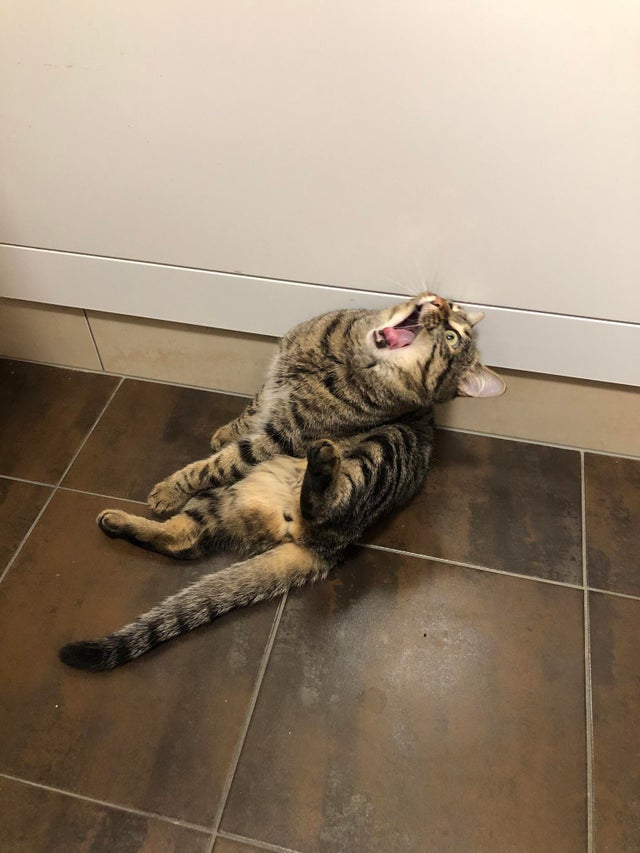Almost every cat seems to love catnip. Its occasional use is also recommended by most feline experts to enhance a cat’s lifestyle. But to answer this question, no, cats cannot overdose on catnip. However, it can have some other reactions if a cat consumes too much of it. Read on to find more about it.
First of all, let’s try to figure out more about catnip:
Catnip is an herb having a very strong smell. This plant belongs to the mint family and has downy leaves along with purple-colored spots on white flowers. The leaves have a serrated edge, which makes them look like a saw.
Catnip is also known by several other names like catmint, catwort, or catsup. All these names come from the cat’s attraction to this plant. The consumption of catnip causes a cat to hallucinate and can also bring some changes in a cat’s neurology. Catnip can be considered as a recreational drug for cats. Catnip is like marijuana for cats. It is recommended that the use of catnip be occasional since its excessive use may lead to undesirable effects on the cat, including loss of mental stability.
A cat should be given fresh catnip in a small quantity once in 2 weeks. There are also other options like catnip toys, which you can buy from the pet store or online. They are actually very safe. Cats usually don’t play with toys for very long, and most of them lose their interest after a few minutes. However, there is a risk where the cat might get addicted to the toy. In this type of incident, it is recommended that you take away the toy after the cat has played with it for a reasonable amount of time. Cats should not be allowed to play with them for more than 15 minutes.
Do Cats Smell or Eat Catnip?
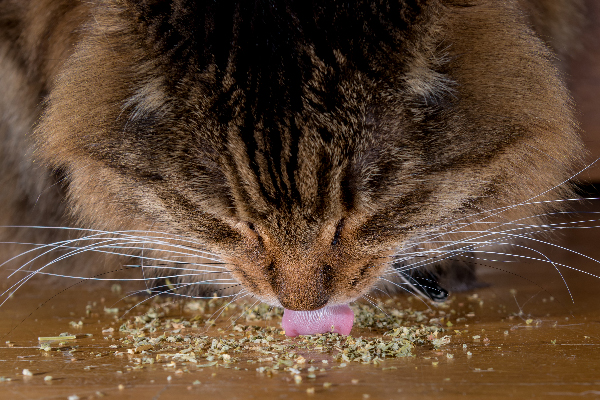
Cats can both smell and ingest catnip to get the effect of the plant. However, a cat gets the most intense experience through the smell. Their sense of smell is far greater than humans. Once the cat sniffs the plant, they go kind of nuts. When cats sniff the plant, it triggers their receptors in their brain, which are mostly the happy ones. Sniffing can uplift their mood, and they will likely have a wonderful experience.
However, when a cat eats catnip, the effect is completely different from when it smells the plant. They start to mellow out. The reaction of the cats can differ from one cat to the other as well. Some cats may react by rubbing themselves on the plant or anything that is close by while others my roll or flip. They might even growl while others meow. Some cats can even become extremely aggressive.
These sessions usually last for almost about 10-15 minutes, after which they get back to their normal behavior. It may take several hours for the plant to affect the cat again. However, it is important to allow the cat to reset before it consumes catnip again. Even though cats don’t overdose on the plant, they may get sick if they consume too much.
Do all cats react to catnip?
No, not every cat reacts to catnip. Only about half of the cat’s population react to catnip. Even though a cat may react to catnip, there is no guarantee their offsprings will have the same ability. And cats that do not have any reaction may have offsprings which can react to catnip. This ability is not hereditary.
Catnips does not have an effect on kittens. Kittens only respond after their ninth week. Cats need to be a little old to have any reaction with catnips.
Catnip’s effect on the behavior of a Cat
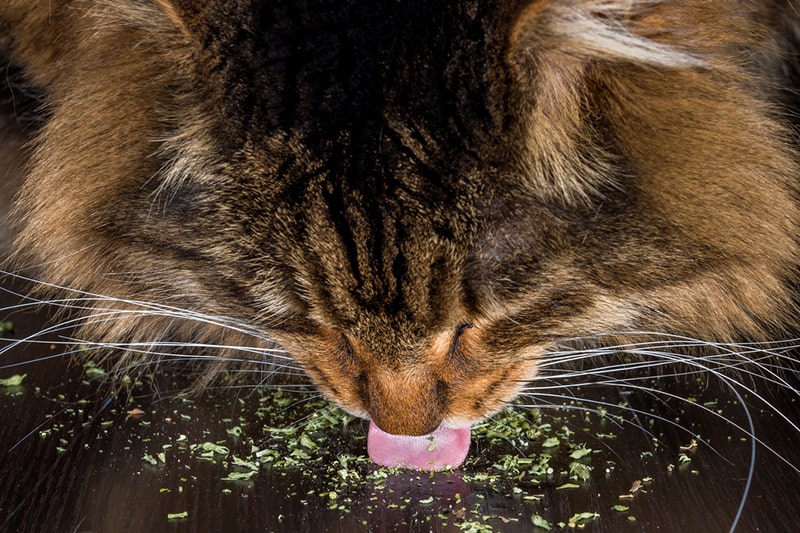
Catnip affects the behavior of a cat in many ways. Some of the ways are:
- Cats may start hallucinating after consuming or smelling catnip. This is one of the most common effects on cats.
- Another effect can be aggression. You will notice this effect on cats when you try to make contact with them.
- Some cats can feel very excited after the consumption of catnip.
- It has been found in certain cats that, after the consumption of catnip, they lay down in a sphinx-like position.
- Some cats may get in a euphoria state.
- Shaking of the head, rubbing themselves on the floor or an object, and rolling over are some of the most common effects seen on a cat after the consumption of catnip.
- Making weird noises and randomly growling and meowing are effects of catnip.
- This is certainly weird, but a cat may even go to a state of depression after eating catnips.
- A sudden burst of energy is also an effect of catnip on a cat.
- All these effects of catnip on a cat may last for about 10-20 minutes. It has also been found that cats will lose their interest in catnip once they are done with the effects.
Can catnip be dangerous for a cat?
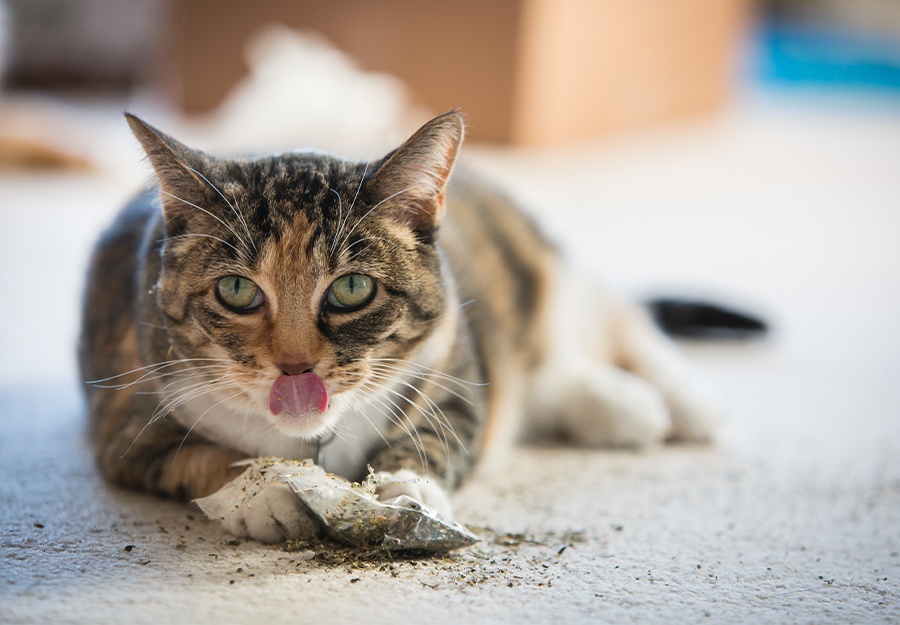
The answer to this question is both yes and no. Technically speaking, consuming large quantities may result in the cat vomiting, but however, cats limit themselves from ever eating too much. They do not eat to the point where they get sick.
It definitely has an effect on a cat’s neurological sense, making them hallucinate or depressed, but then again, they only last for a short period of time.
Catnip may not be suitable for cats that inhibit aggressive behavior since catnip is known for making a cat aggressive. So if you let an aggressive cat consume on these, they may become more aggressive. Another instance where you should keep catnip away is during a cat’s pregnancy. Catnip stimulates a cat’s uterine; therefore, it can be harmful to the cat when it is pregnant.
Besides the pregnant cats, epileptic cats should also stay away from catnip. It has been shown to increase the chance of seizures in cats.
So the toxicity of catnip depends on a lot of factors, and when you assess these factors, catnip cannot necessarily be considered as toxic for cats. However, precautions must be taken so that the catnip does not pose a threat to the cat.
Other Uses of Catnip:
Catnip has been used for several other purposes in the past. People drank it as a tea by mixing it in water. There are other instances where it has been used to relieve the pain from a toothache and also childbirth in women. It has also been used to treat rheumatism and asthma.
Before the availability of marijuana in the 1960s, there were instances of people who tried to get high on them and even bought catnip toys. However, people stopped using it as a stimulant after the availability of marijuana. It was also not as effective as marijuana.
Besides all these uses, catnip has also been used for cough, cold, measles menstruation, hiccups, etc. If you are out camping, it can be used as a mosquito repellent since the nepetalactone in the catnip keeps mosquitoes away. The only downside is that it lasts only for a few hours.
How to provide catnip for your cat
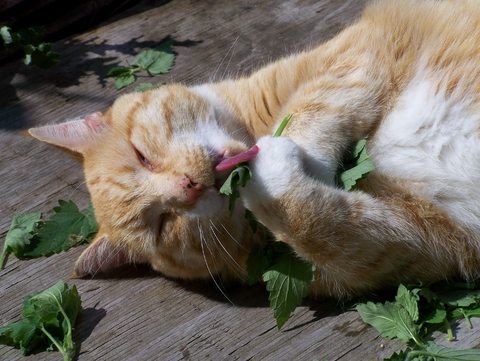
If you have a cat and you want to let it have some fun on catnip, then you can easily grow them in your garden. Catnip is very easy to grow, no matter where you are. It is suitable for almost all types of climate. However, you must be careful about where you grow them. Catnip grows like a weed and is considered an invasive plant. It might damage the aesthetic beauty of your garden.
You can also plant them indoors if you do not have a garden. And if you don’t want to grow them, you can even freeze them in a plastic container or a bag. The plant’s stimulating ingredients can be preserved for your cat to enjoy. Catnip may lose its effectiveness if it is kept outside for a long time. It is important that you preserve it well by storing it in the freezer with an airtight container.
There are catnip sprays which you can avail from the market as well. They have less amount of nepetalactone, which makes it suitable for young kittens. You can also use this spray as a way to steer your cats to a new scratch post or bed.
Conclusion:
Catnip is one of the most pleasant and attractive smells for a cat. It can either have a positive or a negative effect, depending on how a cat consumes it. The nepetalactone, which is present in catnip affects the receptors in a cat’s brain, making them react the way they do.
Even though cats do not overdose on catnip, it is important to make sure your cat does not consume too much of it. It may cause vomiting and diarrhea in a cat. A cat may limit itself from consuming too, but that does not mean you should solely depend on a cat’s senses. They might over-consume it sometimes.
